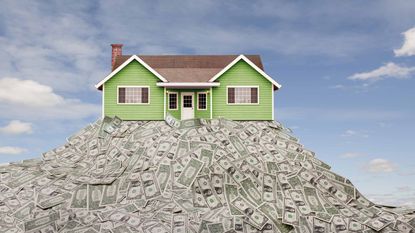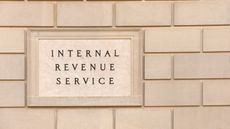PODCAST: Tap the Money Tied Up in Your Home with Keith Gumbinger
Housing prices have been on a tear, and that means home equity is up, too. Turning that value into cash in your wallet can be complicated, though. Equity expert Keith Gumbinger helps us sort it out. Also, "sell in May and go away": urban legend or investing strategy?
- (opens in new tab)
- (opens in new tab)
- (opens in new tab)
- Newsletter sign up Newsletter


Listen now:
Subscribe FREE wherever you listen:
Links mentioned in this episode:
- Sell in May and Go Away? Here We Go Again … (opens in new tab)
- Keith Gumbinger, Vice President of HSH.com (opens in new tab)
- This Hot Housing Market with Daniel Bortz (opens in new tab)
- Black Knight Mortgage Data Reports (opens in new tab)
Transcript:
David Muhlbaum: With home prices on a tear, you might have more money in your house than you think. By that we mean home home equity: the value of your property minus whatever you still owe on it. But turning that into cash that you can put to use can be complicated. We'll dig into the equity market with an expert. Also, you might have heard of "sell in May and go away." Well, should you? All coming up in this episode of Your Money's Worth. Stick around.

Sign up for Kiplinger’s Free E-Newsletters
Profit and prosper with the best of expert advice on investing, taxes, retirement, personal finance and more - straight to your e-mail.
Profit and prosper with the best of expert advice - straight to your e-mail.
David Muhlbaum: Welcome to Your Money's Worth. I'm Kiplinger.com senior online editor David Muhlbaum, joined by my cohost, senior editor Sandy Block. How're you doing, Sandy?
Sandy Block: I'm doing great, David.
David Muhlbaum: Well, good. It's a beautiful May day here, though I closed the windows to keep the bird noise down. And May is the month mentioned in one of those old Wall Street adages, "sell in May and go away."
Sandy Block: Right, and we're in May, and it will still be May when this drops, so anyone who wanted to follow this idea still has time. To sell stocks, that is. But that's not actually our counsel, right? Because that would be market timing.
David Muhlbaum: Yes, that's correct. Our investing writer Dan Burrows has a good take on "sell in May and go away" out -- we'll link to it (opens in new tab) -- and he's got a fairly sanguine take on the philosophy, he basically calls it a "tired old saw" that gets more attention than it deserves, but still worthy of exploration.
Sandy Block: So is it right or wrong? Are we going to get a binary answer, or is this "it depends?" Not that there's anything wrong with that.
David Muhlbaum: Look, if "sell in May and go away" were flat out wrong, it wouldn't pop up every year, like Punxatawey Phil. It's … you know…. debatable. To quote Dan, "There is evidence that the stock market, on average, tends to underperform in the six-month period between May and October. However, analysts, market timers and academics who have studied the phenomenon extensively can't settle the matter conclusively one way or the other."
And by the way, the basic meaning of "sell in May and go away" is right in there: If stocks don't do well between May and October, maybe you should hold something else. But notice we're talking about May to October? We've already added something there, and we're already complicating the idea of "sell in May and go away." Because it's not, go away forever; you're supposed to buy back in, sometime. It's about when do stocks, as an asset class, perform best … or worst.
Sandy Block: And that's the definition of market timing, which, although it sounds interesting, is something Dan, echoing the rest of us at Kiplinger, actively discourages. Leave your stock allocation alone, except when your personal situation demands changes, such as you're getting close to retirement.. Because, for the regular investor, that sort of portfolio churning, even in the era of free stock trades and such, takes a toll. Opportunity cost, emotional stress. Getting timing right is hard. Do you go back in October? Do you go back in November? You don't know when to go back in, and most people don't get that right.
David Muhlbaum: Right. It's better to stay in, yes. Even though we’ve given away a lot of the plot, Dan's article is still worth a good read (opens in new tab), because it lays out the funky history of "sell in May and go away" and provides some current-year advice for more active investors who might want to fiddle. The whole concept seems to have originated centuries ago in England when merchants, bankers and other interested parties in London's financial district noticed that investment returns generally did worse in the summer. Now, they weren't doing quantitative analysis with supercomputers. They were looking at their ledgers and going, "eh….."
Sandy Block: Really, these rich financiers were looking for an excuse to leave hot, smelly London in the summer and retreat to their Downton Abbey summer houses.
David Muhlbaum: Well, yes. "It's malodorous. I think we shall retire." I guess it worked for them. When we come back, we'll go deep into all angles of home equity with market expert Keith Gumbinger.
David Muhlbaum: We'll go ahead and hope that none of you are literally putting money under your mattress these days. But what you might not fully appreciate is how much money you could have under your own roof. We're talking about home equity here, which has been on the rise as a consequence of this sizzling housing market.
A few weeks ago, we talked about that market broadly. And we broached home equity and its significance to people who aren't actively looking to move. But we wanted to dig in a little bit deeper and explore more angles of using what we might call the bank of home.
And so, we reached out to Keith Gumbinger, Vice President of Mortgage Research firm hsh.com (opens in new tab). Thank you for joining us today, Keith, to let us pick your brain on all things equity.
Keith Gumbinger: Good to be here.
David Muhlbaum: Home equity seems like one of those things that's sort of highly personal. There are millions of homes out there, and they're generally all a bit different. And they're different in their financing, too. Some people will have a mortgage. Well, actually, most people will have a mortgage with its own rate and term. But then, there's also the question, how much of that has been paid off?
But that said, collectively, home equity, we can track it in some ways. And one thing that we saw, and part of the reason we're doing this topic today, is we saw this value of $7.3 trillion in, quote, "tappable equity." That's from the Black Knight firm. I'll put in a link (opens in new tab).
And we're like, "Wow, $7.3 trillion. That's a lot of money." But in part, we also wonder what does that really mean? And so, before we get into building equity and tapping equity and all that for the individual homeowner, can you give us a bit of a sense of the macro picture? Because things seem like they're kind of hopping, right, thanks in part to these double-digit increases in home prices?
Keith Gumbinger: Well, that's definitely where the increase in home equity to that $7.3 trillion has come from, especially in the last couple of years. Home prices have just been skyrocketing. I think the NAR reported March to March existing homes were 17% more expensive this year than last year. And that was on top of a double-digit increase the year before. So if you bought a home within the last couple of years, your equity has been coming up very quickly, mostly due to that fast home price appreciation.
Sandy Block: Because of this big increase in home equity, some people have had concerns about a bubble. They've been talking about making comparisons to 2008, but it looks like that's really not the case now. Not so many people are underwater anymore. Is that right, Keith?
Keith Gumbinger: That's absolutely correct. In fact, from the last downturn in real estate, which is now almost 15 years ago, very few people that actually bought homes at the peak might be still technically underwater in terms of their home value.
The vast majority of borrowers that are experiencing great equity growth right now are homeowners that bought or refinanced within the last five or six or seven years. And they have a very solid equity position to lean on. And generally, this is a comfortable spot for most folks.
In terms of a bubble, there's so few liberal lending opportunities these days. Most underwriting is still very conservative, that borrowers would find it hard to get themselves in trouble. It's never been impossible, but it's difficult.
David Muhlbaum: I feel like in part, the idea of borrowing against home equity in all of its forms, it kind of faded out for a while there, in part because, going back 10 years ago, so many people were underwater or in perilous situations that there wasn't home equity or they were wary of tapping into it. So now that more people have equity and more people have access to it, how does that advantage them? Let's talk about what it actually means in terms of "What can we do with this?"
Keith Gumbinger: Well, certainly it makes people feel better. When you've got equity in your home, you feel like your asset strength is pretty good. That can help you to feel more comfortable in spending additional monies, whether that's necessarily out of your home at an equity expression, or whether you just feel a little more comfortable about spending out of pocket, maybe not saving so hard.
So that gives you a great asset base on which to lean and feel comfortable in your finances with. But for a lot of borrowers, it also can open up tremendous amounts of flexibility for them. If you've got ongoing expenses, maybe medical situations going on for you or maybe your parents or children, educational costs, what have you, this can allow you an opportunity to have access to some funds at a low interest rate environment that gives you flexibility to cover those. Of course, you want to repay them as you go, but it gives you flexibility in your budget.
Sandy Block: And Keith, I'd like to follow up on that. And maybe you could sort of walk us through sort of the basics here, what a HELOC is versus a home equity loan, why you might want to consider one versus the other. And then, as a follow-up, I'm hearing that it's actually getting hard to get some of these now, even though they're very attractive to people. So maybe you could talk to us a little bit about that.
Keith Gumbinger: Oh, sure. A home equity line of credit is just like it sounds. It's very much like a credit card. You set up a dollar amount or are allowed to set up a dollar amount against your house that you can borrow. And you borrow funds and repay them as you go along, usually for a period of about 10 years.
Most of these are based upon the prime rate, which is very low right now, plus a small margin, usually a couple of percentage points. So the average HELOC can have a rate right around 5 1/4% right now. Now, you're allowed to borrow and set up funds against your house, usually up to about 80% of the value of the home minus what you owe on the first mortgage. So you can establish a line of credit, borrow and repay as you go along, and ultimately you're going to give yourself that flexibility you might be looking for.
Now, home equity loans, really they're kind of a fixed-rate, lump-sum disbursement. You get all your dollars at one time, usually for a fixed term: 15 years, 10 years, 20 years. Those are the ones that are hard to come by right now. And that's partly because of a change in the regulatory environment a few years ago that requires more disclosure and more compliance costs on the part of lenders.
Unlike a first mortgage where they can have hundreds of thousands of dollars on which they can make interest, a home equity loan might be $10-, $20-, $30,000 with the high cost of compliance on top of it. It's hard for lenders to make money that way. So those are a little more difficult to come by.
David Muhlbaum: Yeah, that's a reminder that you may have equity in your house, but converting that equity into cash for you to take with you or do whatever you had in mind, there's a bank in the way. And it's got to make sense for you, and it's got to make sense for the bank. Just because equity is tappable, there could be hurdles to making that cash-out happen for you.
Keith Gumbinger: And also, the change in the way equity is made available to you compared to 15 years ago, used to be able to easily borrow up to a 100% of the value of your home. In fact, a lot of homes during the bubble days were financed that way, with a piggyback mortgage, a first mortgage for 80% of the value of the home and a second mortgage of 10%. Lots of borrowers kind of pre-borrowed their equity in order to get into their home.
Today, 80% is going to be about your maximum. It's really hard to get yourself leveraged out to a point where it might be a problem. And this way, you're more likely to be in a sustainable sort of equity environment rather than getting deep in the hole.
Sandy Block: Keith, another thing that was very common 15 years ago was cash-out refinances. People would refinance their homes and take a bunch of money out. And I guess people are still doing that now as they're looking at home equity loans or home equity lines of credit. What are good uses for this money? And what are bad uses for this money? Are there times when it's a good idea to do this and times when it's not?
David Muhlbaum: So judgy, so judgy.
Keith Gumbinger: There can always be good and bad reasons for doing certain things. When we talk about using the equity in your home, and aside from home price appreciation, building equity in your home can take a very long time. You have a mortgage for 30 years. You're making payments over a long period of time. It's hard to build equity.
If you're going to use your equity, making good choices with that money is really what you want to try to shoot for and investing in the asset itself, right? Home improvement is very popular and very useful in terms of using your home equity. Improve the value of the asset. Improve the livability. You can actually make ... perhaps over time, even make all the equity that you spent back, plus then some.
Investing in people, stuff like education for yourself or for your children, for example, is a very effective use of your home equity because again, you're looking to build an asset yourself, your career, or your children's career. So you're going to get some return out of that in the long haul.
And we can talk about maybe not such great uses. If you're going to take money out of your home, an appreciating asset, and put it into something that's NOT an appreciating asset, that might be a car, or that might be a boat, for example. Yeah, that might not be necessarily the greatest use of the equity in your home.
Some of those things, it would be hard to turn to someone and say, "You shouldn't buy yourself a great car." If your car is a piece of junk and falling apart, that's your only avenue to get yourself a better car so you can get to work every day. Is that a valuable use? Yes. Is it an investment-type use where you're going to get a return on it? Probably not.
David Muhlbaum: Could you maybe get better financing from the manufacturer? Probably.
Keith Gumbinger: Possibly, and it's about trying to fit it in and make the best possible use for you out of it. And no, you don't want to go buy fur coats or go on unnecessarily expensive vacations. But for some audiences, a lifetime of wanting to travel the world and a one-time opportunity to do it, maybe that's a great use for you -- provided you're going to pay it back and manage it wisely. You're not going to empty it out and then just hope for the better in the long haul.
David Muhlbaum: Right. Keith, I know you have a lot of tools on hsh.com (opens in new tab). And I'm hoping you could review a little bit of them, particularly with the idea of helping people know what equity they have. Unlike the stock market, this one's a little harder to price. People know how much they owe. How much their home is worth is dodgier.
Keith Gumbinger: Well, your equity stake depends upon, of course, not only what your home is worth, but, of course, what you still owe on it. And, of course, you can look right in your mortgage statement and know exactly where you started, from what you borrowed originally, and what you still owe on that. But your equity stake's probably -- hopefully -- going to be a lot larger than that because of home price appreciation.
Depending upon when you bought your home, the payments you've been making, any prepayments you might have made, you can come to a tool like our home equity calculator (opens in new tab) that will allow you to take a look at establishing where you were, when you started, where you are now in your mortgage, and uses some reckoning tools from the Federal Housing Finance Agency, some of their house price data, to reckon where the value of your home is right now and give you a sense of how much you actually can borrow if you need to.
Sandy Block: Keith, I'd like to ask you a question that always gets a lot of interesting reader responses, and it is this. Particularly if you're getting close to retirement, should you pay off your mortgage?
And I'm asking that question now because mortgage rates are so low that a lot of people are arguing that you should just hold onto that mortgage for as long as you can because there are better ways to use your money. But on the other hand, a lot of people find a great comfort, particularly when they retire, to not having a mortgage. So I'm interested in your opinion on that.
Keith Gumbinger: Well, the answers, of course, are simple, yes and no. There can be a case made for paying off your mortgage, as you know, cleaning up your finances before you retire and your income becomes "fixed," quote, unquote.
There can be reasons to let it carry along. Over the years, I've come to understand the best possible outcome for that. Some of it depends upon where you are in your mortgage right now. If you've only got a few years left and your finances are in good shape and you'll be getting into your retirement age, but your monthly payments aren't going to be unmanageable, should you go cash out an asset to pay off your mortgage? Probably not.
If you're recently in your mortgage, maybe you refinanced. You're 55 or 57. You refinanced to take advantage of great rates, extended your term out to a brand new 30 years, your mortgage is going to be with you a while. And you probably don't want to empty out your retirement account or your savings to go pay that mortgage off.
Part of it has to do with where you are in your mortgage, how far you're going to be paying this into retirement. And, of course, whether or not it's a problem is really what it comes down to. If you are in a situation where your mortgage payment's not going to be a problem for you, you can certainly just carry it along. Leave your finances alone, and save your money as you normally have been for your retirement.
David Muhlbaum: Since we've broached the idea of how much are we paying for our house in retirement, maybe we should just go there and talk about the idea of your house paying you in retirement. What I'm talking about here, of course, is reverse mortgages (opens in new tab), which have sometimes been controversial. I'm going to ask you a very open-ended question, Keith. What do you think about reverse mortgages?
Keith Gumbinger: For a lot of borrowers, they can provide a great level of comfort and flexibility. If you are someone who is, and I wouldn't say simply living on Social Security, but whose retirement assets are meager, and if you're in an expensive part of the world, and certainly on the coasts, very expensive, those tax bills come up every year. Maintenance bills come up every year. Your fixed income may not go as far as you thought it might or would.
So, what about a reverse mortgage? What about opening up the equity in your home and establishing a line of credit so you can have some flexibility or an annuity structure so some dollars come in each month, help support you along? Or maybe you just want to ... you want to do a lump sum, clean up all your other finances and give yourself some flexibility in there.
Reverse mortgages can be a very important part of a well-structured retirement plan. Unfortunately, in the early days, they got kind of a bad reputation because of a lot of high fees, a lot of misunderstandings on how these things were structured and how they needed to be repaid after borrowers passed away, very complicated.
What's in the marketplace today predominantly are those home equity conversion mortgages that are backed by the FHA. They're backed by HUD. These are well structured, easy to understand.And unlike in some of the wild and wooly days of yesteryear, you actually have to go get counseling before you can sign up for one. They'll talk to you about the risks and rewards. Fees are more structured and probably more manageable, I guess, than they were at one point in time. Figure around 6% of your available equity will disappear in terms of fees, but you can get yourself in a very good circumstance.
Keith Gumbinger: Most importantly ... and we talked about, should you pay off your mortgage in retirement. If you decide to go with a reverse mortgage, your first mortgage gets retired. You pay it off with the proceeds from this. You eliminate the debt you have to make payments on. You can borrow money that you don't have to make payments on. And this can provide very good levels of flexibility, especially if we're talking about a meager sort of asset structure when you're retired.
David Muhlbaum:We broached the idea of someone who has a house that's worth a lot of money, but maybe not a lot of other assets. I'm curious, though. For other people at other points in their life who maybe have gained a tremendous amount of equity in their house to the point that they are what we might call house poor, what about the idea of borrowing against that to invest, maybe not in an education, to directly invest in the stock market or other assets or equities?
Keith Gumbinger: It's certainly something that folks do. It's not something that you could easily sit there and recommend as a blanket strategy for everyone, right? So you wouldn't want to empty all the equity out on your home and dump it into a market. If you're of the mind that you are comfortable with investing, and you have what you would feel to be some ... and I wouldn't call it excess. But if you feel you've got some money that could be used for a ... and I wouldn't call it play money. That's a bad idea, too -- remembering it's the equity in your home.
But if you've got enough equity, then you've got good financial wherewithal, and you've got some funds you think you want to play with a little bit, and you've got some things you might want to invest in or you're comfortable playing into the marketplace, could you invest in that and get greater returns than in anything else, including education or whatnot? Sure.
One thing that they always tell you, right, is past performance is not an indication of future returns. So you need to be careful about it because once that equity is gone, it may not come back. So caution is to be advised for that, but do people do it? Sure, they do.
Sandy Block: Keith, I'm going to ask you the really hard question. One of the reasons the housing market has been so hot and we have so much equity is because interest rates have been very, very low. And there's been a little bit of an increase, but it seems like every week, then, it goes down a little bit more. What's your sense of how long this is going to last because obviously that is something that would pause or slow down this housing market?
Keith Gumbinger: Well, we would expect interest rates to firm up at some point as the economy gets better. So right, we're still in this, coming out of this COVID sort of arrangement. Economic growth, as I'm sure you've seen, the number is over 6% the first quarter annualized. Growth is really starting to boom pretty well. Before too much time passes, the Federal Reserve is going to start backing down its purchases of bonds. They're going to start lifting short-term interest rates a little bit, and mortgage rates will increase.
Now, what that will generally slow down is refinancing, right? And your cash-out refinancing is a portion of that. As rates go up, it becomes less profitable to refinance, so that will start to slow down. But buying homes, and in terms of home prices and that sort of thing, what we see right now is there's a tremendous amount of demand out there. We've got all kinds of what they would call demographic tailwinds from millennials coming into their prime home buying years. And there's just not a lot of supply. The Realtors reported just about two months of available supply (opens in new tab) when they prefer to see about six months of stock available to buy.
Home prices are probably going to continue to rise and firm even though mortgage rates will also start to firm up because right now affordability is still pretty good. I'm sure, Sandy, you remember the days of 7, 8, 9, 10%, God help us all, 21 1/2% mortgage rates back in the eighties. People still bought homes then.
And these rates are fantastic compared to almost every other time in history, except maybe the turn of this year, so lots of demographic tailwinds. And even if rates went up a little bit, half a percentage point, even a full percentage point, folks will still be buying homes, and home prices will likely be well supported for a while.
David Muhlbaum: Well, Keith, thank you for being brave enough to go right out there into the rate timing question. And I think the message for our listeners is that there's still time.
Keith Gumbinger: Definitely that's the case for a while yet, probably most of this year, and probably into next year.
David Muhlbaum: Well, thank you so much for joining us, Keith. We really appreciate it.
Keith Gumbinger: It's been my pleasure.
David Muhlbaum: That will just about do it for this episode of Your Money's Worth. If you like what you heard, please sign up for more at Apple Podcasts (opens in new tab), or wherever you get your content. When you do, please give us a rating and a review. And if you've already subscribed, thanks. Please go back and add a rating and a review if you haven't already.
To see the links we've mentioned in our show along with other great Kiplinger content on the topics we've discussed, go to kiplinger.com/podcast. The episodes, transcripts and links are all in there by date.
And if you're still here because you want to give us a piece of your mind, you can stay connected with us on Twitter, Facebook, Instagram, or by emailing us directly at podcasts@kiplinger.com. Thanks for listening.
Subscribe FREE wherever you listen:

Block joined Kiplinger in June 2012 from USA Today, where she was a reporter and personal finance columnist for more than 15 years. Prior to that, she worked for the Akron Beacon-Journal and Dow Jones Newswires. In 1993, she was a Knight-Bagehot fellow in economics and business journalism at the Columbia University Graduate School of Journalism. She has a BA in communications from Bethany College in Bethany, W.Va.
-
-
 IRS Service Improvements Could Bring Faster Tax Refunds
IRS Service Improvements Could Bring Faster Tax RefundsRecent IRS improvements mean taxpayers could see faster tax refunds next year and beyond.
By Katelyn Washington • Published
-
 For Best Tax Savings, Year-Round Tax Planning Is Essential
For Best Tax Savings, Year-Round Tax Planning Is EssentialFor optimal, ongoing tax reduction, consider employing these nine strategies throughout the entire year.
By Andy Leung, Private Wealth Adviser • Published
-
 PODCAST: Tax Breaks for College Finance with Kalman Chany
PODCAST: Tax Breaks for College Finance with Kalman ChanyPaying for College Paying for (ever-pricier) college is a challenge that this consultant meets head on with highly specific guidance.
By David Muhlbaum • Published
-
 PODCAST: Car-Buying in an Inflated Market with Jenni Newman
PODCAST: Car-Buying in an Inflated Market with Jenni NewmanBuying & Leasing a Car With cars both scarce and expensive these days, what to do if you want – or need – a new ride? Car-buying strategist Jenni Newman of Cars.com shares some tips. Also, more on the magical 9% savings bond.
By David Muhlbaum • Published
-
 PODCAST: How to Find a Job After Graduation, with Beth Hendler-Grunt
PODCAST: How to Find a Job After Graduation, with Beth Hendler-GruntStarting Out: New Grads and Young Professionals Today’s successful job applicants need to know how to ace the virtual interview and be prepared to do good old-fashioned research and networking. Also, gas prices are high, but try a little global perspective.
By David Muhlbaum • Published
-
 PODCAST: Is a Recession Coming?
PODCAST: Is a Recession Coming?Smart Buying With a lot of recession talk out there, we might just talk ourselves into one. We take that risk with Jim Patterson of The Kiplinger Letter. Also, dollar stores: deal or no deal?
By David Muhlbaum • Published
-
 PODCAST: This Couple Tackles Love and Money as a Team
PODCAST: This Couple Tackles Love and Money as a TeamGetting Married Fyooz Financial, the husband and wife team of Dan and Natalie Slagle, have carved out a niche advising other couples with the money questions that come with pairing up. Also, where is this troubled stock market headed?
By David Muhlbaum • Published
-
 PODCAST: Which Documents to Keep, Which to Shred and Which to Scan
PODCAST: Which Documents to Keep, Which to Shred and Which to Scanhome insurance A speedy recovery from disaster can depend on your recordkeeping. Kiplinger’s Personal Finance writer Rivan Stinson tells us how to get our papers in order.
By David Muhlbaum • Published
-
 PODCAST: High Gas Prices with The Kiplinger Letter’s Jim Patterson
PODCAST: High Gas Prices with The Kiplinger Letter’s Jim Pattersoncars Why are we paying so much more at the pump? How long will it last? What can you do? Plus: Congress is making changes to retirement-savings rules again.
By David Muhlbaum • Published
-
 PODCAST: The 2022 Real Estate Market with Daniel Bortz
PODCAST: The 2022 Real Estate Market with Daniel BortzBecoming a Homeowner Daniel Bortz doesn’t just write about home sales and housing prices – he’s been in the business. He’ll share insights about the real estate outlook for 2022 and “how-to” tips for both buyers and sellers. Also, the pain of high gas prices.
By David Muhlbaum • Published









